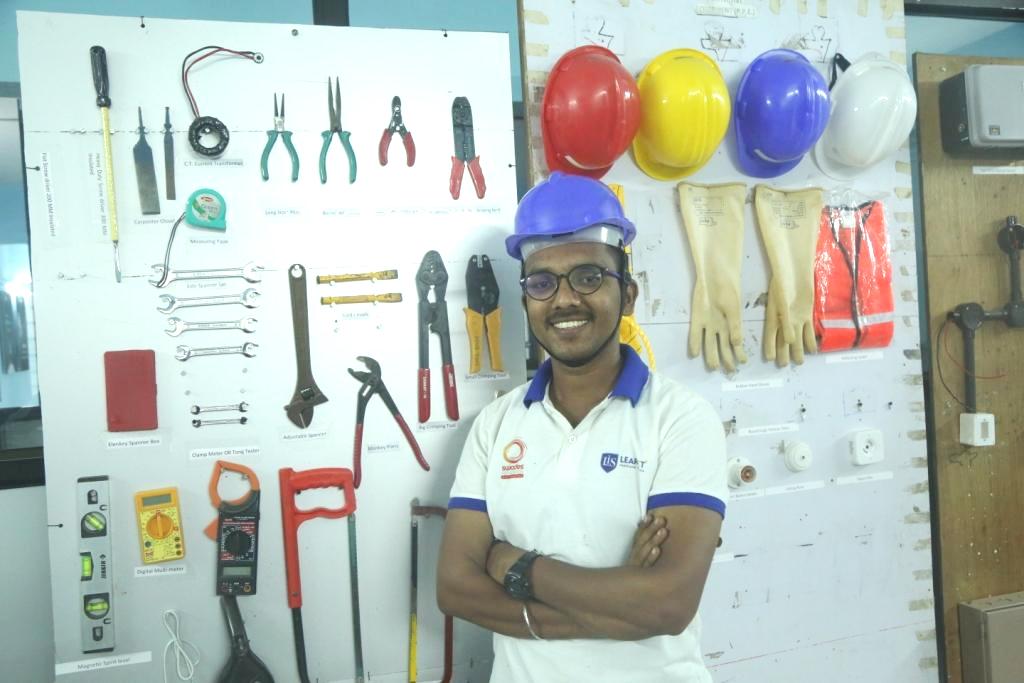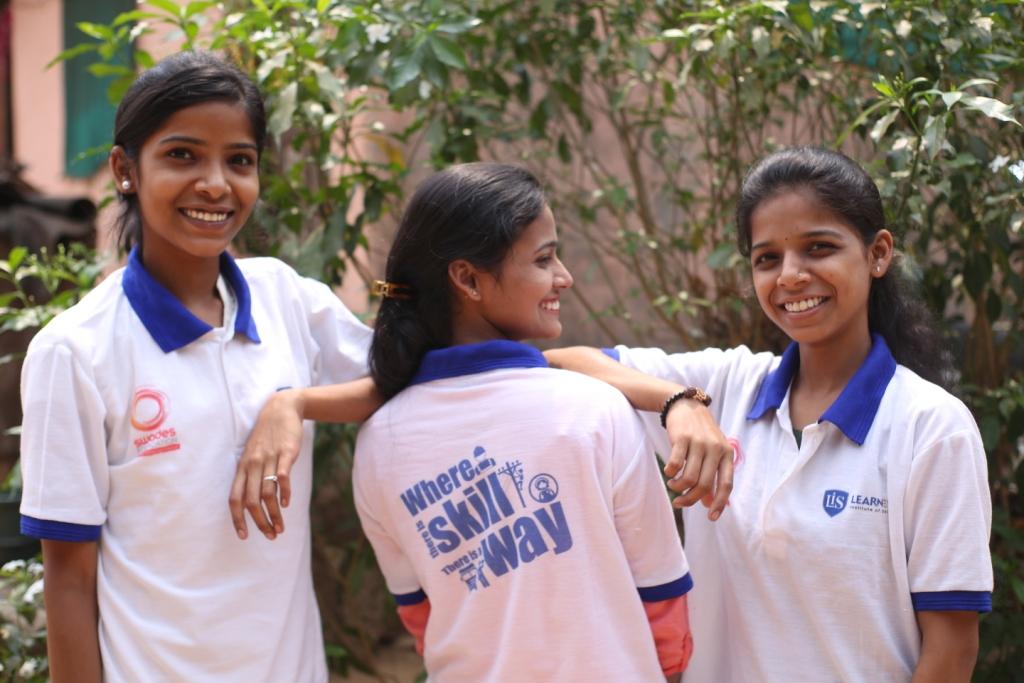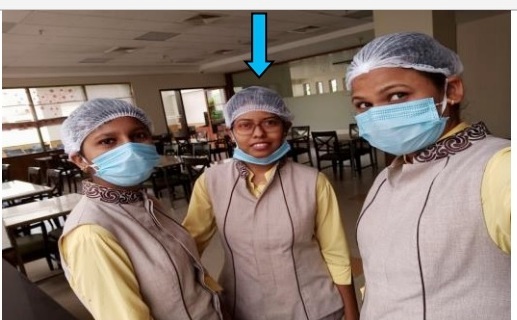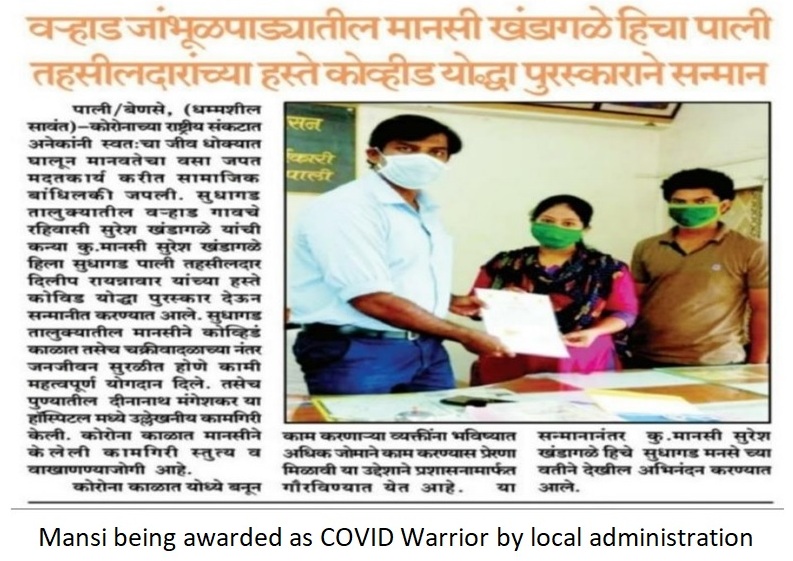Amidst the rich diversity of India, rural communities are treasure troves of promise, they hold immense potential, waiting to flourish with the right opportunities. Skill development emerges as a guiding light, bridging the gap between aspirations and achievements. It is here where Swades Foundation's Youth Skilling Program plays a pivotal role.
Skill development isn't just about acquiring knowledge; it's about empowering individuals to craft their destinies. In an exclusive interview, TheCSRUniverse delves into the heart of this transformative initiative with Mr. Mangesh Wange, CEO, Swades Foundation. From providing insights into the program's inception to discussing the diverse courses tailored for rural youth, Mr. Wange takes us on a journey of empowerment, economic growth, and social change. He shares how this program not only reduces forced migration but also creates self-reliant communities, empowering the youth with skills that transcend boundaries.
Explore the complete interview below to discover how skill development is rewriting the narratives of rural youth empowerment.
Q&A
Q. What societal or economic factors in rural Maharashtra led to the creation of Swades Foundation's Youth Skilling Program, and how does it specifically address the skills gap and unemployment issues faced by the youth in those areas?
A. The lure of city life coupled with the lack of job opportunities in their own villages means that a lot of youth in rural parts of Maharashtra move to urban centres like Mumbai and Pune with basic education, to take up menial jobs with no established career path or growth. This leads to a hugely compromised quality of life. Our skilling programs are aimed at providing the youth relevant, employable skills that best suit their interests and hand holding them with post-placement support for a year.
Following are the key goals and objectives of the program:
1. Enhancing employability: This includes both technical skills specific to certain industries and sectors, as well as transferable skills like communication, problem-solving, teamwork, etc.
2. Reducing unemployment: Our program also addresses the issue of youth unemployment by providing young people with the necessary skills to secure gainful employment.
3. Bridging the skills gap: Many industries and sectors face a skills gap, where the demand for certain skills exceeds the available supply of skilled workers. Our programs helps bridge this gap.
4. Promoting healthy migration: Youth in rural India aspire to migrate to cities for a better life but in most cases ending up in menial jobs will be limited to no scope for career progression. Swades’ youth skilling program equips the individual with relevant industry and employability skills to help them build a career in the cities over the years.
5. Encouraging lifelong learning: Youth skilling programs promotes a culture of lifelong learning by encouraging young individuals to continuously upgrade their skills and adapt to emerging trends and technologies throughout their careers.
Q. Could you provide more details about the specific courses offered under the program, and how are these courses tailored to meet the needs of rural youth in Maharashtra?
A. The courses are diverse, ranging from electrician courses, masonry, hospitality, accounting, beautician assistance, general duty assistant etc. Recently, to cater to the growing climate economy, we have also included courses for EV technicians and Solar technicians.
The duration of the course is anywhere between 40-55 days - with some courses having NSDC affiliation.
We also provide lodging & boarding facilities for youth who struggle with lack of public transportation or are from far off remote villages.
As of today, we have trained 5,026 youth and placed 4,210 in employment/ self employment with 79 percent retention in the first year.
Q. How did your partners like Udyogwardhini and Learnet Skills contribute to the program's success, and were there any obstacles during implementation, like community engagement, awareness, or financial literacy challenges?
A. We collaborate with local administrations, other NGOs, implementation partners, communities, donors. The idea is to leverage each other’s expertise in a way that is beneficial to everyone. Skill training is the expertise at Udyogwardhini and Learnet Skills, hence we partner with them for our skilling program. They help right from mobilisation till placement of the youth and also do monitoring on the progress of youth afterwards while they are working.
Key challenges to be overcome include building aspirations for acclimatizing in tough urban life, bringing clarity of the skill to be acquired and managing finances especially in the beginning. To overcome these obstacles, engaging with community especially the parents and family of the youth and interaction with past alumni helps.
Q. How does the program ensure that the skills acquired by the youth align with the demands of the job market, and are there any mechanisms for continuous skill development or upskilling? Additionally, do you provide any market linkages to the participants?
A. Our partners map opportunities in nearby areas. Our training, apart from being skill-based, also helps in counselling of the students, leading to a growth mind set. This is intended to sustain through their years of working and learning.
We also do twice a year “call & connect” with youth after they are placed / start earning. This helps to understand the changing needs and aspirations. Until today, 40 alumni have enrolled for upgrading their skills and we’re in the process of reaching out to more.
Q. Can you explain the impact of the program on rural households in terms of income generation, and how does it contribute to economic development in rural Maharashtra?
A. The average annual income of a household is augmented by 80k to 1.20L - often it doubles the household income. As of today, INR 30 crore income is generated per annum from our skilling interventions in rural Maharashtra.
The program also has the highest ROI, where an investment of ~INR 18K-20K results in 5 times the income for the household in less than 15 months of completion of the training. To ensure skin in the game for the youth about 15% of the fee is paid by the youth. This however is further subsidized to INR 500 for youth belonging to the poorest of poor households.
Besides the financial impact, it is the huge social impact and the pride of the family that makes this program special for us. There are thousands of stories of rural households who have undergone from less than Rs 50,000 annual HH income to more than Rs 2 lacs and enhanced social status!
 Q. How does the program address the broader goal of reducing forced migration and creating self-reliant rural communities?
Q. How does the program address the broader goal of reducing forced migration and creating self-reliant rural communities?
A. Our skilling programs are aimed at providing the youth relevant, employable skills that best suit their interests and hand holding them with post-placement support for a year. Equipped with employable skills and placement opportunities encourages the youth to make an informed choice about their career path, while also knowing the value that they bring to the table. This way they are able to better negotiate with employers, take up existing opportunities in their villages or as in some cases, start a venture of their own. In addition to technical skills, our program recognizes the importance of developing life skills and soft skills - this includes communication, teamwork, problem-solving, leadership, and financial literacy. These skills enhance participants' employability.
Q. What metrics or methods does Swades Foundation use to measure the long-term success and sustainability of its skilling initiatives in rural Maharashtra?
A. The metrics for this program include the number of students completing the skills training on time, number of youth placed on job, average first year income and continuation on job for more than 6 months. Our partner organizations track the trainees on a monthly basis post-placement. Additionally we conduct a 6-monthly sample-based audit apart from an annual external audit.
Q. Could you elaborate on Swades Foundation's 4E strategy (Engage, Empower, Execute, and Exit) and how it is applied in the context of the Youth Skilling Program?
A. Swades empowers the village ecosystem to bring sustainable change in the lives of the community members by working on Water and Sanitation, Health, Education, Livelihoods and Rural Empowerment. The 4 E strategy - Engage, Empower, Execute & Exit - ensures this support is not limited to "GIVING" and commits to creating empowered and informed community members.
In the context of skilling programme, this refers to engaging with the youth, employers, partners and facilitating their connection with each other, empowering them with hard and soft skills, executing the programs that meet industry standards and eventually, planning our exit after facilitating their placement and retention at the first job, but more importantly, leaving them with a renewed sense of aspiration and confidence to make a better life.
Q. Can you share success stories from rural youth in Maharashtra and the valuable lessons learned that could benefit other social sector stakeholders?
A. Success stories:
 Sneha Nandkumar Karande, residing in Shirgaon GP, Mahad, transformed her life with the help of Swades-Learnet Institute of Skills. Coming from a low-income family, she aspired to break free from poverty. Sneha enrolled in a 45-day Food & Beverage Service Steward course at Lonere Centre and secured a Steward position at Katyani Restaurant in Baner, Pune, in September 2019. Earning INR 1.44 lakh annually, along with free food and accommodation, she became a source of pride for her family. Her goal is to become a Captain in a 5/7 Star Hotel, and she continues to strive for it. This story exemplifies the transformative impact of skill development and support in empowering individuals to pursue their dreams.
Sneha Nandkumar Karande, residing in Shirgaon GP, Mahad, transformed her life with the help of Swades-Learnet Institute of Skills. Coming from a low-income family, she aspired to break free from poverty. Sneha enrolled in a 45-day Food & Beverage Service Steward course at Lonere Centre and secured a Steward position at Katyani Restaurant in Baner, Pune, in September 2019. Earning INR 1.44 lakh annually, along with free food and accommodation, she became a source of pride for her family. Her goal is to become a Captain in a 5/7 Star Hotel, and she continues to strive for it. This story exemplifies the transformative impact of skill development and support in empowering individuals to pursue their dreams.
 Mansi Suresh Khandagale, a trainee at Swades-Learnet Institute of Skills, Lonere-Raigad, pursued the "General Duty Assistant (GDA)" course. With a background in a family where her father ran a small hotel and her mother was an Aanganwadi Sevika, Mansi's journey led her to Deenanath Mangeshkar Hospital in Pune. There, she began as a "Multipurpose Health Worker (MPW)" in January 2020, starting at INR 9,000 CTC and later increasing to INR 13,000 CTC due to her dedication. She was also awarded as COVID warrior by Sudhagad-Pali Tehsildar for her work at the hospital. Mansi aspires to advance her career in healthcare, having saved INR 40,000 from her salary, which she generously contributed to her family. Her mother expressed gratitude to Swades Foundation and Learnet Institute of Skills for providing her daughter with a remarkable platform. This success story showcases the transformative impact of skills development and career opportunities.
Mansi Suresh Khandagale, a trainee at Swades-Learnet Institute of Skills, Lonere-Raigad, pursued the "General Duty Assistant (GDA)" course. With a background in a family where her father ran a small hotel and her mother was an Aanganwadi Sevika, Mansi's journey led her to Deenanath Mangeshkar Hospital in Pune. There, she began as a "Multipurpose Health Worker (MPW)" in January 2020, starting at INR 9,000 CTC and later increasing to INR 13,000 CTC due to her dedication. She was also awarded as COVID warrior by Sudhagad-Pali Tehsildar for her work at the hospital. Mansi aspires to advance her career in healthcare, having saved INR 40,000 from her salary, which she generously contributed to her family. Her mother expressed gratitude to Swades Foundation and Learnet Institute of Skills for providing her daughter with a remarkable platform. This success story showcases the transformative impact of skills development and career opportunities.
Lessons:
• Tailored mobilization: Gauge the need, opportunity, interest of the youth/community and accordingly mobilize action to ensure high rate of success and retention
• Collaborate: Social sector is collaborative, not competitive. Make sure to partner with the right people who can leverage each other’s expertise in the best way to serve a larger common cause.
• Empower the community to create sustained impact in a way that they can lead the change. At Swades, we do so with the VDC - Village Development Committee). With its foundation as the fundamentals of self-governance, VDCs constitute a group of self-motivated individuals in the community who are responsible for driving the change in their hamlets. The VDC is responsible for collection of maintenance fees for water schemes, identifying poorest of poor households, and identifying the needs of a household. It is also the anchor that will help Swades exit a village smoothly, ensuring that the communities are self-reliant.
Q. What are the program's future goals for expanding its reach and course offerings?
A. We will continue to provide an ecosystem for rural youth to acquire the right skills and opportunities to achieve their aspiration. We also intend to work with institutions such as colleges and ITI and intervene at the institution level to help youth find meaningful employment. Our courses are always aligned to market needs and we continue to do so in the future too. We have recently added a couple of courses that are forward looking such as EV & Solar and continue to evolve more in this space as we move forward.





 Q. How does the program address the broader goal of reducing forced migration and creating self-reliant rural communities?
Q. How does the program address the broader goal of reducing forced migration and creating self-reliant rural communities? Sneha Nandkumar Karande, residing in Shirgaon GP, Mahad, transformed her life with the help of Swades-Learnet Institute of Skills. Coming from a low-income family, she aspired to break free from poverty. Sneha enrolled in a 45-day Food & Beverage Service Steward course at Lonere Centre and secured a Steward position at Katyani Restaurant in Baner, Pune, in September 2019. Earning INR 1.44 lakh annually, along with free food and accommodation, she became a source of pride for her family. Her goal is to become a Captain in a 5/7 Star Hotel, and she continues to strive for it. This story exemplifies the transformative impact of skill development and support in empowering individuals to pursue their dreams.
Sneha Nandkumar Karande, residing in Shirgaon GP, Mahad, transformed her life with the help of Swades-Learnet Institute of Skills. Coming from a low-income family, she aspired to break free from poverty. Sneha enrolled in a 45-day Food & Beverage Service Steward course at Lonere Centre and secured a Steward position at Katyani Restaurant in Baner, Pune, in September 2019. Earning INR 1.44 lakh annually, along with free food and accommodation, she became a source of pride for her family. Her goal is to become a Captain in a 5/7 Star Hotel, and she continues to strive for it. This story exemplifies the transformative impact of skill development and support in empowering individuals to pursue their dreams. Mansi Suresh Khandagale, a trainee at Swades-Learnet Institute of Skills, Lonere-Raigad, pursued the "General Duty Assistant (GDA)" course. With a background in a family where her father ran a small hotel and her mother was an Aanganwadi Sevika, Mansi's journey led her to Deenanath Mangeshkar Hospital in Pune. There, she began as a "Multipurpose Health Worker (MPW)" in January 2020, starting at INR 9,000 CTC and later increasing to INR 13,000 CTC due to her dedication. She was also awarded as COVID warrior by Sudhagad-Pali Tehsildar for her work at the hospital. Mansi aspires to advance her career in healthcare, having saved INR 40,000 from her salary, which she generously contributed to her family. Her mother expressed gratitude to Swades Foundation and Learnet Institute of Skills for providing her daughter with a remarkable platform. This success story showcases the transformative impact of skills development and career opportunities.
Mansi Suresh Khandagale, a trainee at Swades-Learnet Institute of Skills, Lonere-Raigad, pursued the "General Duty Assistant (GDA)" course. With a background in a family where her father ran a small hotel and her mother was an Aanganwadi Sevika, Mansi's journey led her to Deenanath Mangeshkar Hospital in Pune. There, she began as a "Multipurpose Health Worker (MPW)" in January 2020, starting at INR 9,000 CTC and later increasing to INR 13,000 CTC due to her dedication. She was also awarded as COVID warrior by Sudhagad-Pali Tehsildar for her work at the hospital. Mansi aspires to advance her career in healthcare, having saved INR 40,000 from her salary, which she generously contributed to her family. Her mother expressed gratitude to Swades Foundation and Learnet Institute of Skills for providing her daughter with a remarkable platform. This success story showcases the transformative impact of skills development and career opportunities.












.jpg)



